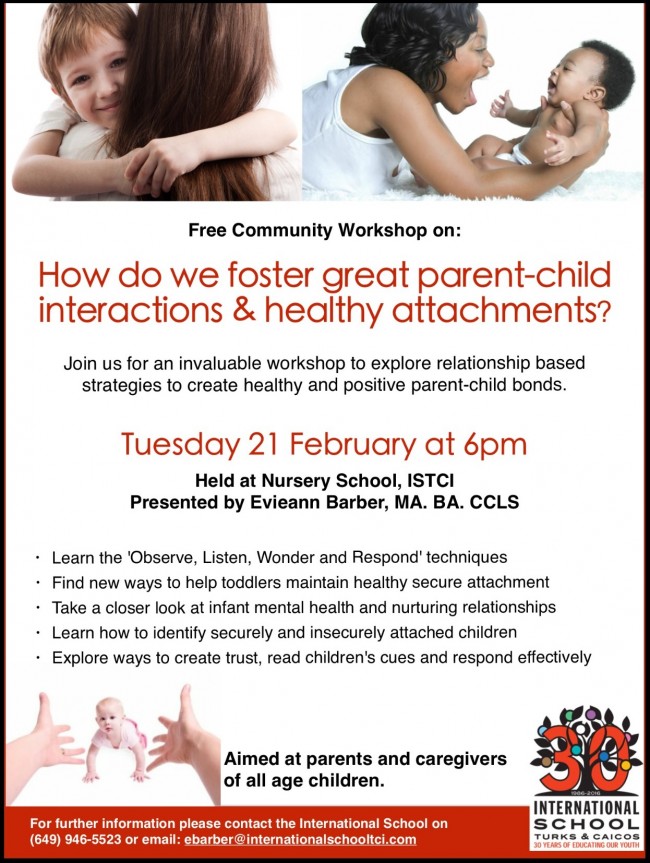Blog
ISTCI Nursery School Workshop – Healthy Bonds, 21 February
- February 19, 2017
- Category: Extra Curricular Activities (Clubs), Grade 1, Grade 2, Grade 3, Grade 4, Junior Kindergarten, Nursery, Preschool, PTA, School News, Senior Kindergarten

How do we foster great parent-child interactions & healthy attachments?
Workshop presented by: Evieann Barber, Nursery School Manager, BA, MA, CCLS
Tuesday 21 February 2017 at 6pm at ISTCI Nursery School.
Parents and caregivers of all age children are welcome to join this free workshop to discuss:- Find new ways to help toddlers maintain healthy secure attachment
- Learn the 'Observe, Listen, Wonder and Respond' techniques
- Take a closer look at infant mental health and nurturing relationships
- Learn how to identify securely and insecurely attached children
- Explore ways to create trust, read children's cues and respond effectively

Contact Us:
For further information please contact the International School on (649) 946-5523 or email: ebarber@internationalschooltci.com
Upcoming Workshops:
We also have another free workshop coming up on 'Mindfulness & Creating Space'.
Join us on Tuesday 28 March at 6pm Held at Nursery School, ISTCI. Presented by Evieann Barber, BA. MA. CCLS
Our Community Newsletter:
Welcome to ‘Invest Time in a Child’s Mind’, a free and informative and educational paper for parents and early years educators. We aim to provide research-driven, school success tips with easy reach of parents.- Issue 3 of the Nursery Newsletter ‘Invest Time in a Child’s Mind’ - January 2017
- Issue 3 of the Nursery Newsletter ‘Invest Time in a Child’s Mind’ - September 2016
- Issue 2 of the Nursery Newsletter ‘Invest Time in a Child’s Mind’ - April 2016
- Issue 1 of the Nursery Newsletter ‘Invest Time in a Child’s Mind’ - January 2016
How do we foster great parent-child interactions & healthy attachments?
By Molly Grosvenor and Mary Beth Slack MA BA Ed Issue 4, January 2017 A child who is securely attached has confidence that they can count on parents when they experience distress giving them security to explore the world and establish relationships. A child who is insecurely attached lacks the confidence that their parent will protect or comfort him when in distress. These children feel they can’t rely on parents and so develop other strategies for finding comfort elsewhere. Relationships must be consistent, predictable and emotionally and physically safe to provide a secure base for children. Attachment Theory focuses on the process through which infants and young children develop a feeling of security and their parent’s ability and willingness to protect them from harm. ‘Attachment’ is the foundation of mental health. It is how we develop our view of relationships and our view of the world. Mental Health is a state of mental functioning resulting in productive activities, fulfilling relationships with other people and the ability to adapt to change and cope with adversity. Infant Mental Health Practice believes children and their parents will develop optimally within nurturing relationships and parents must feel nurtured in order to nurture their children.How teachers foster healthy parent-child interactions using relationship based strategies?
- Support parent’s understanding of importance of responsive and playful interactions to early growth and development.
- Help parents to read child’s cues and interpret them and anticipate their needs, supporting the development of a secure and trusting attachment relationship.
- Tailor your understanding and teaching of child development to the developmental level of the parent.
- Maintain awareness of your own emotional response to the parent and child as they interact and respond to one another.
What do parents do to help toddlers’ maintain healthy secure attachment?
- Provide social referencing (is this person okay?)
- Help toddler understand the world (what is this?) Support language and communication skills
- Support autonomy (seek approval and parents give admiration and encouragement)
- Help with regulation limits (develop “self speak” based on what they hear from their parents.)
- Prepare toddler for what is coming next (routines make the world feel organized for children)
Model the ‘Observe, Listen, Wonder, Respond’ technique.
- Observe - Take time to sit with child, follow child’s lead and invitations, remain emotionally and physically available and engaged.
- Listen - Attend to your child’s cries or words, share in your child’s games, songs, joy, laughter, listen for your child’s expressions of emotion and bathe them in emotional vocabulary.
- Wonder - Be open, non-judgmental, wonder about their own feelings and allow some time to think before you act.
- Respond - Support the child’s curiosity, set limits consistently, remain flexible, adaptive, and balanced in response.


